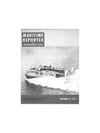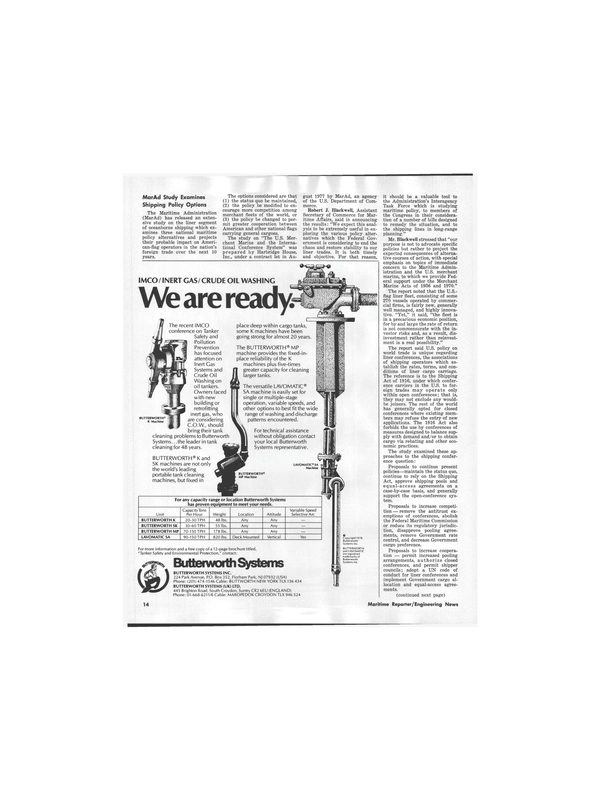
MarAd Study Examines Shipping Policy Options
The Maritime Administration (MarAd) has released an extensive study on the liner segment of oceanborne shipping which examines three national maritime policy alternatives and projects their probable impact on American- flag operators in the nation's foreign trade over the next 10 years.
The options considered are that (1) the status quo be maintained, (2) the policy be modified to encourage more competition among merchant fleets of the world, or (3) the policy be changed to permit greater cooperation between American and other national flags carrying general cargoes.
The study on "The U.S. Merchant Marine and the International Conference System" was p r e p a r e d by Harbridge House, Inc., under a contract let in August 1977 by MarAd, an agency of the U.S. Department of Commerce.
Robert J. Blackwell, Assistant Secretary of Commerce for Maritime Affairs, said in announcing the results: "We expect this analysis to be extremely useful in exploring the various policy alternatives which the Federal Government is considering to end the chaos and restore stability to our liner trades. It is both timely and objective. For that reason, it should be a valuable tool to the Administration's Interagency Task Force which is studying maritime policy, to members of the Congress in their consideration of a number of bills designed to remedy the situation, and to the shipping lines in long-range planning." Mr. Blackwell stressed that "our purpose is not to advocate specific policies but rather to project the expected consequences of alternative courses of action, with special emphasis on topics of immediate concern to the Maritime Administration and the U.S. merchant marine, to which we provide Federal support under the Merchant Marine Acts of 1936 and 1970." The report noted that the U.S.- flag liner fleet, consisting of some 270 vessels operated by commercial firms, is fairly new, generally well managed, and highly innovative.
"Yet," it said, "the fleet is in a precarious economic position, for by and large the rate of return is not commensurate with the investor risks and, as a result, disinvestment rather than reinvestment is a real possibility." The report said U.S. policy on world trade is unique regarding liner conferences, the associations of shipping operators which establish the rates, terms, and conditions of liner cargo carriage.
The reference is to the Shipping Act of 1916, under which conference carriers in the U.S. to foreign trades may operate only within open conferences; that is, they may not exclude any wouldbe joiners. The rest of the world has generally opted for closed conferences where existing members may refuse the entry of new applications. The 1916 Act also forbids the use by conferences of measures designed to balance sup ply with demand and/or to obtain cargo via rebating and other economic practices.
The study examined these approaches to the shipping conference question: Proposals to continue present policies—maintain the status quo, continue to rely on the Shipping Act, approve shipping pools and equal-access agreements on a case-by-case basis, and generally support the open-conference system.
Proposals to increase competition— remove the antitrust exemptions of conferences, abolish the Federal Maritime Commission or reduce its regulatory jurisdiction, disapprove pooling agreements, remove Government rate control, and decrease Government cargo preference.
Proposals to increase cooperation — permit increased pooling arrangements, a u t h o r i z e closed conferences, and permit shipper councils; adopt a UN code of conduct for liner conferences and implement Government cargo allocation and equal-access agreements.
In its analysis, the study team used a computer model in performing more than 30 simulations to calculate the variations in profitability of vessel operation under the three different scenarios.
Three U.S. trades were chosen for detailed study and to exemplif y the different competitive environments.
They are the North Atlantic, Mediterranean, and the Venezuelan portions of the Latin American trade.
"The North Atlantic trade is an extremely i m p o r t a n t t r a d e that demonstrates the effects of current U.S. policies on a route served by well-established and well-financed companies from both the U.S. and our main trading partners," the report said. "The Mediterranean trade represents a more competitive and more unstable trade. The Latin American (Venezuela) trade is almost totally bilateral with a small 'third flag' component, and as such tends to be representative of the effects of increased cooperation." Altogether, 11 types of behavior — actions deemed most likely to occur during the 1977-86 timeframe — were simulated in the study; not all of them in each trade area, but including a base case for each and such additional factors as Eastern Bloc and the third-flag expansion, rebating, and capacity rationalization. The impact of these actions as indicated in the s i m u l a t i o n s are summarized by route and scenario in the report.
In its major general conclusions, the study team found that: Over the long run, adopting a policy of increased competition on all trades would mean that U.S.- flag operators would be fewer in number but larger in size. Substantial increases in competition in most U.S. trades would create problems for major trading partners and could intensify existing international shipping policy disputes.
That policy also would likely reduce the U.S.-flag market share.
A policy of increased cooperation would support the continued viability of a larger number of smaller operators and encourage their future participation.
"The primary concern of the U.S. Government must be to ensure the carriage of U.S. oceanborne cargo under conditions that will support the policy and achieve the objectives of the 1936 Merchant Marine Act, as amended," the report said. "The simulations demonstrate that with increased cooperation, these objectives are more nearly achieved." A limited number of copies of the full contract report are available for review in the MarAd Office of Public Affairs, pending publication by the agency. Copies of the executive summary are available upon r e q u e s t at the same office, Room 3895, Department of Commerce, 14th and Constitution Avenue, N.W., Washington, D.C. 20230.
Read MarAd Study Examines Shipping Policy Options in Pdf, Flash or Html5 edition of September 15, 1978 Maritime Reporter
Other stories from September 15, 1978 issue
Content
- Data Sheet Describes Shipboard Interior Fireproof Panels page: 4
- Bell Aerospace Delivers 160-Ton Air Cushion Landing Craft To Navy page: 6
- Avondale To Construct Two Multi-Product Ships For Ogden Marine page: 6
- Orion Gautreaux Named Zapata Vice President page: 6
- Eagle Dredging Awards $25-Million Contract To Avondale Shipyards, Inc. page: 8
- Newfoundland Headed For Major Economic Advances In 1980s page: 9
- ALRC Gets $13-Million Award To Supply Pumps For Boeing-Built Ships page: 10
- W.E. Christiansen Jr. Joins St. Louis Ship page: 10
- PSI Completes Total Package Concept With Todd 'Apache' Contract page: 12
- MarAd Study Examines Shipping Policy Options page: 14
- Three-Day Maritime Safety Meeting Set For Chicago October 2-4 page: 15
- J. Ray McDermott & Co., Inc. Delivers 126-Foot Tug To Louisiana Tugs Company page: 16
- First Crab Boat Built By Halter Marine, The 150-Foot Alaskan Enterprise, To Operate In Bering Sea For Francis Miller page: 16
- Boeing Awards Six Hydrofoil Contracts Totaling $4,360,000 page: 18
- Hongkong United Dockyards Ltd. (HUD) Forms New Subsidiary page: 18
- NKK Signs Agreement With Baker Marine Corp. page: 20
- Women Invade Engineers' Seagoing Dredge Fleet page: 20
- Technical Report On Mooring For LNG Ships Released By MarAd page: 22
- Port Electric Named Marine Distributor By Jeamar Winches Ltd. page: 22
- Perry Oceanographies Designs And Builds New Undersea Work System page: 23
- Samson And SMATCO Join To Expand Traction Winch Market page: 24
- Captain Tom Smith Forms CTS And Associates page: 24
- Charles Lehman Elected ACBL Vice President page: 24
- Swann Oil Relocates New York Office page: 24
- IMODCO Receives Third Contract From PEMEX In Two-Month Period page: 24
- James H. Sanborn Joins Interstate And Ocean Transport Company page: 26
- L. James Gardner Joins Bath Iron page: 29
- Castle & Cooke, Inc. Plans Purchase Of Seven Ships page: 29
- Nominations Are Open For Shepheard Award For Maritime Safety page: 30
- Human Element In Ship Operation Is Subject Of Maine Maritime Seminar page: 30
- Halter Marine Adds Tenth Shipyard page: 30
- Raymond Subsidiary Awarded $10-Million Contract In Venezuela page: 36
- Port Everglades Foreign Trade Zone Expansion Approved page: 36
- Canadian Shipbuilding Production Summary For First Six Months page: 36
- Marine Concrete Structures Delivers First 2 Platforms From New Dock Facility page: 38
- The 1,000-Foot M/V George A. Stinson Joins National Steel's Fleet Of Ore-Carrying Vessels page: 40
- Australian Designs Fast 1,600-Ton Containership With Crew Of Only Five page: 40
- SNAME Gulf Central Section Told How A Load Line Assignment Is Obtained page: 43
- Repairing Vessels Since 1834, Camden Ship Repair Company Starts $4-Million Expansion page: 44
- API President Suggests That Oil Firms Should Participate In Solving U.S. Energy Dilemma page: 44
- World And U.S. Bulk Shipping page: 46
- The Effect Of The 1978 IMCO Tanker Safety And Pollution Prevention Conference On Ship Design And Operation page: 49
- James Sweat Joins Matzer Associates page: 49
- Offshore Logistics, Inc. Announces Earnings For The Year Ended June 30 page: 49
- Maritime Transportation Research Board Names Five New Members page: 50
- Francis A. Martin And Ottaway, Inc. Name Norman Jensen Partner page: 50
- Francis W. Bauer Joins ORBA Corporation page: 51
- Jardine Plans To Restructure Oilfield Servicing—New Name Jardine Offshore Promet page: 52


